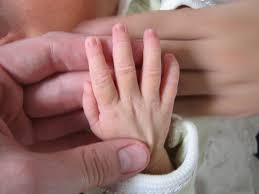
After having a baby, 67 percent of couples see their marital satisfaction plummet, according to research by John Gottman, PhD. The arrival of the first baby can throw parents into a total life change overnight. Many individuals, used to life with flexibility and autonomy, have a difficult time adjusting to the demands of a newborn, despite the fact that they love their new child. Some moms, who had been very successful in careers, find themselves overwhelmed with the daily tasks of newborn care which includes nursing or bottle feeding round the clock, middle of the night diaper changes, and periods of holding baby while he or she cries that can last hours.
There was a time when new mothers were showered with support from grandmothers, aunts, and sisters after a baby arrived. But today, many modern moms are caring for newborns at home in isolation. Unfortunately, the isolation is contributing to a host of problems, including marital distress. Learning how to care for a newborn without any support can feel a marathon that just won’t end.
Although the birth of a baby is exciting and joyful, a new baby can create significant stress. Many couples who would describe themselves as having a happy and loving relationship before the birth of the first child, may find themselves fighting after baby arrives. It is common for couples to experience conflict around finances, careers, division of household duties, sex, in-laws and extended family, and how each partner spends free time.
Since most couples choose to start a family this news may seem discouraging. Yet, it leads to a very important question. Is there anything that couples can do to ensure that their relationship will remain strong and connected even after the birth of their first child? Marriage and Family Therapists will be the first to tell you that there are many things couples can do to strengthen their relationship no matter what the situation. And one one way for couples to re-connect is by engaging in mindulness practices together.
Mindfulness-Based Relationship Enhancehance (MBRE) is just one of many programs out there offered for couples. In a study done at The University of North Carolina (Carsen et all, 2004), it was found that couples who committed to an 8 session MBRE program signfificantly positive benefits. Some of the results included increased: relationship satisfaction, relatedness, closeness, and acceptance of one another. It appears that mindfulness practices being actively applied once the baby arrives, or even before, can prevent a marital satisfaction from plummeting once the baby comes.
New parents may not have time to add anything else to their life with a baby at home (such as an 8 session MBRE program). Therefore it may be difficult to commit to course together outside of the home. Yet, some of these practices are simple to add to a daily routine. If the couple can set aside even 10 - 20 minutes a day for mindfulness practice together, perhaps while baby sleeps, they will reap the benefits of having a more connected relationship while becoming more responsive parents. Below is a short list of mindfulness practices to help you get started:
Silent Walking: In this practice, the walker remains silent while bringing awareness to all senses. The walker focuses on the movement of walking and on the way the foot and body feels when being lifted up and on the ground. Attention is also focused on the sound of the wind, the leaves rustling, the birds chirping, the way the sun feels on ones face or how the wind feels against ones body. This practice can easily be done as a couple, walking silently but together. After couples walk silently, they can have a discussion about what the practice felt like for them.
The Raisin: The raisin is an enjoyable practice for the couple to do together. Each person holds a raisin in silence for several minutes. The purpose is to focus all aspects of the raisin - the ridges, the stickiness, size, color, etc. Next, the individuals eat the raisin with a focus on chewing the raisin very slowly. Once the raisin is eaten, the couple can take turns asking each other questions. Questions asked can include are how does it look, feel, taste.
Body scan. When body scanning, the individual focuses on each body part and notices whatever body sensations, thoughts, or feelings arise without judgment. They can each take turns doing the exercise and state out loud or in their mind what they are experiencing. To start, the couple can lay down on the ground and get comfortable focusing on their breath. One person will have a turn while the other names the body parts out loud beginning with feet moving all the way up to the top of the head. Then the couple will switch.
Gratitude list: This is a wonderful practice to move into state of love, appreciation, and feelings of well being. The couple can do this short exercise any time such as at the start of dinner, while taking a walk, or when driving in the car. Each person takes a turn naming what he or she is grateful for and continues for around 5 to 10 minutes. This is a lovely practice to model and experience around young children as well.
Do you practice mindfulness with your partner or spouse? If you do, please tell me about the practice and how it has impacted your relationship in the comment box below!



























